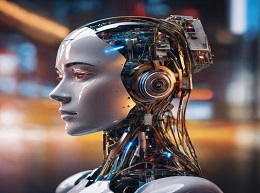Exploring the Latest AI Trends in 2023

The rapid evolution of artificial intelligence (AI) continues to redefine industries and reshape the way we live and work. As we step into 2023, the landscape of AI is characterized by groundbreaking advancements and transformative trends that promise to revolutionize various sectors. From the integration of AI in healthcare to the emergence of autonomous vehicles, let's delve into the latest AI trends that are driving innovation and shaping the future.
1. Autonomous Vehicles:
In 2023, autonomous vehicles are no longer a distant dream but a tangible reality reshaping the transportation industry. Companies like Tesla, Waymo, and Cruise are leading the way with their advancements in self-driving technology. For instance, Tesla's Full Self-Driving (FSD) Beta program has garnered significant attention, showcasing impressive capabilities in navigating complex road scenarios. Additionally, Waymo's driverless taxi service in select cities is redefining urban mobility, offering a glimpse into a future where transportation is safer, more efficient, and environmentally friendly.
Example: Waymo's expansion of its driverless taxi service to new cities, such as Miami and San Francisco, demonstrates the growing acceptance and adoption of autonomous vehicles in real-world scenarios.
2. AI in Healthcare:
AI is revolutionizing healthcare by improving diagnostics, treatment planning, and patient care. In 2023, AI-powered medical imaging solutions are becoming increasingly sophisticated, aiding healthcare professionals in accurately detecting and diagnosing various conditions. Moreover, AI-driven virtual health assistants are enhancing patient engagement and providing personalized healthcare experiences. With advancements in natural language processing (NLP) and machine learning algorithms, these virtual assistants can analyze symptoms, offer medical advice, and even schedule appointments, thereby streamlining healthcare delivery.
Example: IBM Watson Health's AI-powered virtual assistant, which assists healthcare providers in analyzing patient data and recommending personalized treatment plans, exemplifies the transformative impact of AI in improving patient outcomes.
3. Ethical AI and Bias Mitigation:
As AI systems become more prevalent in decision-making processes, addressing ethical concerns and mitigating biases is paramount. In 2023, there is a growing emphasis on developing AI models that are fair, transparent, and accountable. Researchers and practitioners are actively working on techniques to identify and mitigate biases in AI algorithms, ensuring that they do not perpetuate discrimination or inequality. Additionally, frameworks for ethical AI governance are being established to guide the responsible development and deployment of AI technologies across various domains.
Example: Google's continued efforts to address bias in AI algorithms, such as releasing the Model Cards framework for transparency and conducting bias audits on its products, demonstrate a commitment to ethical AI principles.
4. Edge AI and IoT Integration:
The convergence of edge computing and AI is driving innovation in the Internet of Things (IoT) landscape. In 2023, edge AI solutions are gaining momentum, enabling real-time data processing and decision-making at the edge of the network. This facilitates efficient utilization of resources, reduces latency, and enhances the responsiveness of IoT devices and applications. From smart homes to industrial automation, edge AI is unlocking new possibilities for intelligent and autonomous systems that seamlessly interact with the physical world.
Example: The integration of edge AI in smart home devices, such as voice-controlled assistants and security cameras, enables local processing of data without relying heavily on cloud services, ensuring privacy and responsiveness.
5. AI in Cybersecurity:
With the proliferation of cyber threats, AI is playing a crucial role in bolstering cybersecurity defenses. In 2023, AI-driven threat detection and response mechanisms are becoming indispensable tools for identifying and mitigating security risks in real time. Machine learning algorithms analyze vast amounts of data to detect anomalous behavior and potential security breaches, allowing organizations to proactively defend against evolving cyber threats. Additionally, AI-powered security solutions are automating incident response workflows, enabling faster and more effective mitigation of security incidents.
Example: Darktrace's AI-powered cybersecurity platform, which utilizes unsupervised machine learning to detect and respond to cyber threats in real time, exemplifies the effectiveness of AI in safeguarding digital assets against sophisticated attacks.
The year 2023 marks a pivotal moment in the evolution of artificial intelligence, with groundbreaking advancements and transformative trends shaping various industries. From the widespread adoption of autonomous vehicles to the integration of AI in healthcare and cybersecurity, the impact of AI is profound and far-reaching. As we navigate this era of technological innovation, embracing ethical principles and responsible AI development is essential to harnessing the full potential of AI for the benefit of society.
By exploring these cutting-edge AI trends of 2023, we gain insights into the future trajectory of AI and its transformative impact on diverse sectors. As AI continues to evolve and permeate various aspects of our lives, staying informed about the latest trends and developments is crucial for businesses, policymakers, and individuals alike. Embracing the potential of AI while addressing ethical considerations will be key to shaping a future where AI serves as a force for positive change and innovation.